- Home
- Lionel Shriver
Big Brother Page 17
Big Brother Read online
Page 17
Unable to concentrate on the New Holland real estate listings, I slipped out to the vending machine, having fixated on those Doritos. To our mutual embarrassment, I ran into Edison. “Thought I’d get a granola bar,” I claimed, digging for change, and my brother grumbled, “Guess you should make that two.” On return to the computer, I discovered that the granola bar had as many calories as corn chips.
I kept an eye on the clock. Tanner and Cody both walked home, and there was an intersection at which their passages from different schools met. His friends having peeled off, every afternoon Tanner waited at the same oak tree for his sister, whose walk was a bit longer, so they could saunter the last fifteen minutes side by side.
For Tanner to have continued the tradition into his senior year of high school was impressive, surely a last vestige of his role as Cody’s protector when Cleo was metamorphosing from their mother into a demanding, ill-judged pet—one of those baby alligators or pythons that eventually slither off into the sewer. When I lifted the duty of care from him, Tanner had experienced equal parts relief and resentment. His sister’s unambiguous embrace of their father’s second wife irked him. Though they remained a duo of sorts, readily closing ranks in outrage when Fletcher banned frozen pizza, they now led drastically different lives, which exaggerated the disparity in their ages. But Tanner interpreted any distance between him and his sister as all my fault.
Whereas Cody’s memory of their real mother rapidly grew dim, Tanner had been just old enough when their father remarried to conclude expediently that, in preference to choosing between the old mother and the new one, he didn’t need a mother at all. Which was why I was especially nervous of telling my stepson about my “fool’s errand.” If never precisely hostile, Tanner had long given me to believe that my part in his life would always be elective. This made him treacherously inconsistent—fond one moment, icy the next. I worried I was about to give him a pretext for discarding my unnecessary ass completely.
Turning onto Pine Street, I spotted Mr. Cool at the end of the block, his back resting on the oak tree, into whose bark the siblings had years before scored their initials.
“What’s this?” he drawled as I pulled up to the curb. “Limousine service. It’s not that cold.” He must have cherished the final stretch with his sister; he didn’t want a ride home.
I got out of the car; Cody was running late. “We need to powwow.”
“Couldn’t wait fifteen minutes?”
“No, it couldn’t.”
“Gosh, I’m all pins and needles.” Unfortunately, he was in his remote, sarcastic mode.
“It’s so sweet of you to wait for your sister like this. In L.A. we were driven everywhere, but otherwise it would have meant the world to me as a girl if Edison had done the same thing.”
“Edison’s in no shape to walk anybody to the end of the driveway.”
“That’s what I wanted to talk about,” I dived in. “And maybe it’s good Cody’s not here yet. I’ll need you to look out for your sister for a while. You know, the way you used to. I’ll still be a resource, of course—”
“So you’re leaving Dad,” he said—matter-of-fact, with a trace of satisfaction. “Guess he brought it on himself. Least he’ll be the healthiest misery guts in town.”
“I’m not leaving anyone.” Hastily I detailed my grand plan—adding judiciously that I wasn’t at all sure it would work.
He heard me out. “So you’re leaving Dad.”
Rolling my eyes in exasperation, I spotted Cody across the street. She looked stricken. I never showed up in the car like this. Obviously, someone had died.
I waved, and she lumbered with a pack as big as she was to their Meeting Tree. “What’s cookin’?” she asked warily.
“Monotonous isn’t enough for her,” said Tanner. “Pando’s starting a fat farm.”
“You’re a lot of help.” This was not the reassuring briefing I’d rehearsed. I ran through the drill again, which to my own ears sounded far-fetched, self-destructive, and delusional, this time ending, “But I am still your mother, I am not leaving either of you, and I am not leaving your father!”
Cody frowned; it was a lot to take in. “Is Dad clear on that?”
“Not as clear as he should be,” I admitted.
“You said we could visit you guys,” she said. “Why can’t you visit us back?”
“Because your father finds this idea very annoying, and I’ll be honest, he’s pretty mad. Anyway, he thinks your uncle doesn’t have the discipline to lose weight.”
“Do you?”
I couldn’t lie to her. “Maybe not. But the only way to find out is to try.”
“So . . .” she said sullenly. “No more real pasta, just that clumpy soba stuff. No more sneaking fresh brownies when Dad’s in the basement. It’s gonna be like living in a concentration camp. Not even any more rides to swimming practice, because you’re going to be keeping Uncle Edison from hitting the Eggos. However you do that.”
“Yeah, I sure wouldn’t want to get between that guy and the refrigerator,” said Tanner. “Like putting yourself in the way of a buffalo in heat.”
I sensed they would at least have a wonderful walk the rest of the way home at my expense.
Back at Blue Cottages, I plunged into my online short course in losing weight. A search on “diets” produced 43 million hits. I recognized the well-publicized regimens—South Beach, Atkins, alternate day, glycemic index, Dukon, Weight Watchers, Scarsdale, and The Zone—but that was just the beginning. Cabbage diets, smoothie diets, blood-type diets, and coffee enemas. Low-fat, low-carb, low-calorie; 2-4-6-8, what diet do we appreciate. Açaí berry, chicken soup, grapefruit, and lemonade. It got crazier: there were potato chip diets, cookie diets, pizza, candy, peanut butter, and popcorn diets. Hot dog diets, red wine diets, vinegar diets, Twinkie diets; chocolate, ice cream, or baby food diets, and one that recommended tapeworms. I was skeptical of the “negative calorie” diet, though I thought the “air diet” might have something to recommend it, and the “cigarette diet” would at least appeal to Edison.
Navigating the Web maze was perilous, since many of these pages were commercial come-ons, planting the kind of cookies that don’t have chocolate chips. What struck me about the enormous industry I’d brushed up against was that all these plans, programs, supplements, and pharmaceuticals were hawking the one product that American consumers both badly wanted and couldn’t buy: that little packet of determination to stick to the program like a sachet of low-fat salad dressing. Even costly procedures like liposuction couldn’t protect you from eating yourself silly once the arthroscopic puncture was healed, couldn’t keep you from slurping every pound of the yellow glop surgeons pumped into a bedside pail in reverse. No highly paid nutritional consultant could not eat a cupcake for you. Despite the dizzying array of products packaged deceitfully as such, in truth a slim figure was not on the shelf. I had just tripped over a gravel pit of 43 million pet rocks.
After three hours of this, I felt soiled, and all I could think about was food.
“I don’t think any of the methods I researched is the answer,” I told Edison over our dismal supper at the Olive Garden. “They only raise the obsession to a power. So enjoy your meatloaf while you can. I think we’ll have to make food go away.”
“Seem to recall that’s called ‘dying,’ man,” said Edison through his dinner roll; only my glare had prevented him from larding on a third packet of butter. “What about going local? Crystal meth.”
“So you can be thin with no teeth, covered in sores, and brain damaged.”
“Gastric bypass?”
Keeping myself from wolfing down my baked salmon, I was trying to think deeply about the experience of eating it, and didn’t respond to Edison right away. I mashed the pink flakes around my mouth, their texture sandy from overcooking, the flavor disquietingly sweet. At best, the fillet was mildly agreeable, but only w
hen I paid fierce attention; ordinarily I didn’t. That must have been when I first began to formulate my theory about the elusiveness of the edible. I had looked forward to dinner all afternoon; I might look back wistfully on this meal once anything so substantial as salmon was off the menu; but in that exact moment with the fish on my tongue it was as if I were chewing for something that wasn’t there, as in childhood I’d scrambled irately through a cereal box that failed to contain its advertised prize. The more I chewed, the more bewildered I grew by how this fleeting, unseizable pleasure had so enslaved my countrymen that many of us were willing to disgrace ourselves for it; demoralize ourselves for it; demolish a host of other pleasures for it, like running and dancing and sex; destroy this very pleasure itself in its pursuit—for every tidbit I’d consumed since putting on weight had been contaminated with an acrid aftertaste of self-reproach; and even, in extreme cases like the one my brother was fast becoming, die for it. The mystery was oppressive.
“I don’t think so,” I said at last. “Gastric bypass is major surgery, and things can go horribly wrong: infection, stroke. Death, even, which is the very event you get the operation to avoid. Tying off your stomach into a change purse may keep you from eating more than a quarter cup in a sitting, but you still have to starve. The only thing surgery does is take away the decision making. But your decision making is the problem. Even with a bypass, you can cheat; eventually you can tolerate larger quantities, and then you’re back where you started. Besides”—I pulled out my clincher—“they’d make you stop smoking.”
“Forget it,” said Edison.
“I’m sorry to quote Fletcher, but he’s right: the will is a muscle. We have to touch our mental toes.” I was assiduous about using the first-person plural. “And—we know you like to eat, and so do I. So the real question is: What else do you enjoy?”
Edison slumped. “Hard to admit, babe. But at this point I’m not sure there is anything else.”
“Ah,” I said delicately. “Then that is the heart of the matter.”
I wondered if that wasn’t the answer to the mystery, countrywide. It wasn’t that eating was so great—it wasn’t—but that nothing was great. Eating being merely okay still put it head and shoulders above everything else that was decidedly less than okay. In which case I was surrounded by millions of people incapable of deriving pleasure from anything whatsoever besides a jelly doughnut.
chapter two
Dr. Corcoran had a flat, unadorned frankness that I had always liked. He delivered reliable information with a practiced neutrality. He’d treated a second-degree burn from boiling pasta water and kept it from getting infected. He’d stitched a stab wound from my careless removal of an avocado stone so neatly that I regretted the invisibility of the scar; from catering, my hands were crisscrossed in prized tribal tattoos. With that diffident blankness Corcoran cultivated, I hoped he’d be good for Edison, who didn’t need to feel any more harshly judged.
However, during our joint appointment I noticed that lightning-bolt chevrons now etched the doctor’s brow, suggesting that in his leisure time he forwent that blankness for a great deal of scowling. By the end of this consultation, I would be interpreting his neutrality in a different light. It was fatalism. For his practice to have bought such a sturdy, high-poundage scale, he must have seen enough wide-load patients for the investment to earn out.
“You’re pre-diabetic,” Corcoran delivered in a bored, of-course spirit, once Edison had dressed in the examination room and we had assumed chairs before the doctor’s desk. His monotone was almost flip. “Your blood pressure is elevated. At a BMI of over fifty-five, your chances of getting most cancers are significantly raised. You have edema in your extremities—that’s fluid retention, from poor circulation. Your lung capacity is reduced, and if you keep smoking emphysema is almost inevitable—”
“One problem at a time,” I interrupted. “Is Edison in good enough health to go on a severely restrictive diet without keeling over?”
“Probably.” Corcoran sounded casual. “We can bring down the blood pressure with medication. His heart’s in better shape than it has any business being, though he’s still a prime candidate for cardiovascular disease. What did you have in mind?”
“From what I’ve read, we’d eventually have to step it up to eight hundred, then twelve hundred. But to start with, between five and six hundred calories a day.”
Since Edison didn’t gasp, he mustn’t have had any notion how little sustenance that amounted to: two-thirds of one Cinnabon. As for Corcoran, I swear I remember him laughing. Maybe not a belly laugh, but a distinct guffaw. “That’s ambitious.”
“With Edison’s size, there’s no point in doing this if we’re not ambitious,” I said. “Could you tell me what he weighs?”
The doctor glanced at the patient for permission.
“It’s not a state secret, man,” said Edison.
“Three-eighty-six.”
My brother added, “But that’s including boxers.”
It could have been worse. I borrowed a pad and pencil to do the following calculations: 386 – 163 = 223 pounds to lose; 223 × 3,500 calories per pound = 780,500 total calories to burn off. I ballparked that Edison would burn an average of 3,000 calories a day—more at the beginning, less at the end. So 3,000 minus, say, an average of 800 calories of consumption = a 2,200-calorie shortfall per day. And 780,500 ÷ 2,200 = 354.77.
That was days. I dreaded telling Fletcher. Even if Edison stayed improbably on the straight and narrow, we could be roommates for a year.
I opted to look for an unfurnished apartment, figuring that we’d be grateful for the task of making the place habitable. Even before the marathon began, I had grasped the special challenge of this project for me in particular. Hitherto, anything I’d taken on, from bedroom curtains to Baby Monotonous, had entailed, well, doing something. This project was about not doing something, which defied my nature. The project itself took up no time, but rather opened up grotesquely more of it—for I was sobered to consider what a big chunk of the day shopping for, preparing, consuming, and cleaning up after meals routinely colonized. The task of buying mattresses would be a mercy.
Three landlords in a row had sounded positive on the phone, only to lay eyes on Edison and inform us regretfully that the apartment had been taken. Oh, they fell all over themselves to apologize—“Gosh, I’m so, so sorry you guys made the trip! It’s such a coincidence, ’cause this place has been on the market for weeks!”—which around here was the tip-off; their cadence slow and deliberate, Iowans were prone to a nasality that grew pronounced when they were plaintive. I think the owners were afraid he would break things. I wondered if there was a civil rights issue we might have pressed. Those real estate people would have been far more nervous about slamming the door in his face if Edison were black. But when I did some checking, I discovered that the Americans with Disabilities Act didn’t cover the obese. Landlords refusing to rent to lard-asses was perfectly legal.
New Holland has a small population, about 16,000, but still sprawls on its edges, and keeping our search to within a half hour’s walk from Solomon Drive was restrictive; I worried we’d run out of options. Driving around with Edison, I was glad for familiar landmarks that might ground my brother and make him feel at home: the decorative wooden windmill in the center of town; De Vries Bakery, which still sold S-shaped, almond-paste Dutch Letters; Norman Borlaug Park, with its entrance hoop of ungainly cutout tulips; the towering white silo on the edge of town that had always signaled the interminable four-day drive from L.A. was finally over. Yet while I’d accustomed myself to its dimensions in adulthood, Edison still found the windmill jarringly small. The bakery would soon become a torture. Even so inclined, we could no longer climb gleefully on the retired fire engine in the park, because contemporary parents had killjoyed this “death trap” of a jungle gym to the dump. Himmel’s Meatpacking Plant having modernized, its roof no lo
nger sported the signature pink plaster pig.
Nearly buried in the flotsam of chain stories that littered the whole region like the detritus of a flood, these teasing, dreamlike glimpses of childhood visits to our grandparents seemed only to unnerve my brother. Edison was fundamentally at a loss to explain to himself what he was doing here, with a look on his face every time we crossed the whole town like, This is IT? The wide skies and open spaces seemed to make him claustrophobic, as if he might drown in all that nothingness. Admittedly, too, early December didn’t show off the area to its advantage. The fields were dirt. The skies were gray.
At last we were met at a development called Prague Porches by an affable man himself seriously overweight. Dennis Novacek had a clubby quality, and noticeably brightened on encountering a would-be renter even bigger than he was. At least fifty, he’d probably been a big man a while; his gut had shifted downward to center around his groin, and sloshed independently of his gait, lurching left when he stepped right. He recognized Edison as a confederate, so I let my brother do the schmoozing. The two of them took the same protracted time laboring up the stairs, while Novacek remarked how a single flight got your blood running but didn’t tucker you out. He called our attention to the proximity of Dunkin’ Donuts and an all-you-can-eat buffet a five-minute drive away. Edison didn’t disabuse the owner of his assumptions, instead bonding with the landlord over their mutual enthusiasm for the “garlic-butter stuffed crust” at Pizza Hut. Again I was glad; if my brother was leery of making proclamations to strangers, he was coming to appreciate the sinister immediacy of the commitment—for the very first morning after we accepted a set of keys the party was over. Funny, the only thing that bugged me a little was his neglecting to correct Novacek’s misapprehension that Edison and I were married.
The two-bedroom was more attractive inside than its generic exterior would suggest, with a big picture window overlooking some spindly oak trees that had lost most of their leaves. It sobered me that if this diet went according to plan I would see those trees bare and snow-covered, in bud and in full leaf. With everything white and clean, the apartment had an appropriate spareness, the same this-is-life-and-there’s-not-much-to-it starkness of the motel. It was a wiped slate. The simple functional kitchen concealed no bottles of maple syrup in its cupboards, no boxes of confectioner’s sugar. Since the premises were newly renovated, the white walls and beige carpet bore none of the stains of other people’s failings. Its faintly medicinal, punitive aura recalled a rehabilitation clinic, and that’s exactly what we’d turn this place into. I wrote the check.

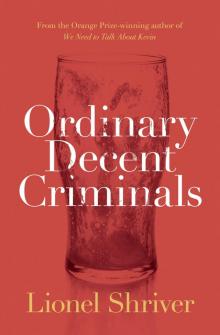 Ordinary Decent Criminals
Ordinary Decent Criminals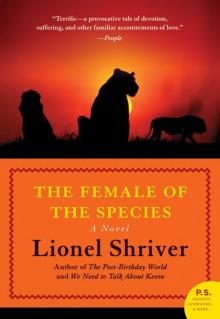 The Female of the Species
The Female of the Species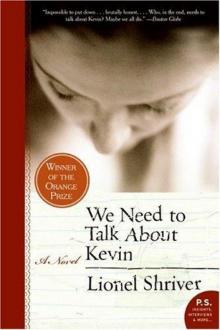 We Need to Talk About Kevin
We Need to Talk About Kevin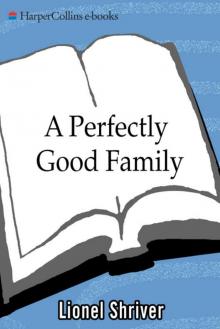 A Perfectly Good Family
A Perfectly Good Family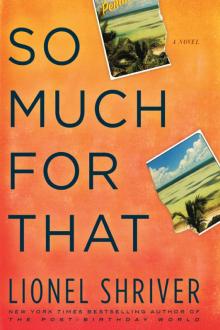 So Much for That
So Much for That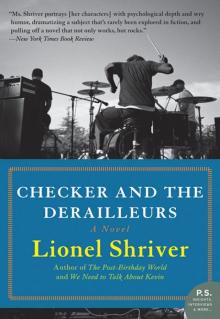 Checker and the Derailleurs
Checker and the Derailleurs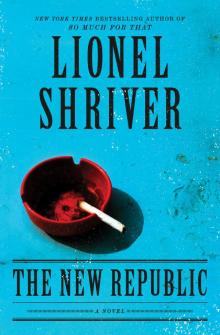 The New Republic
The New Republic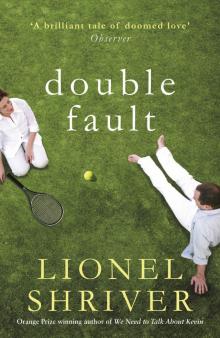 Double Fault
Double Fault Should We Stay or Should We Go
Should We Stay or Should We Go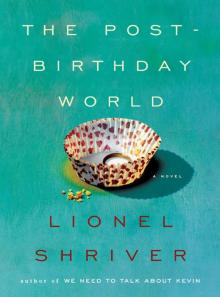 The Post-Birthday World
The Post-Birthday World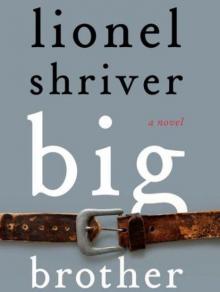 Big Brother
Big Brother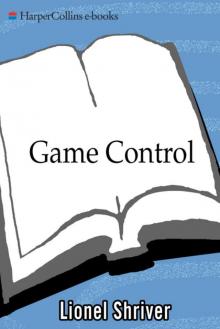 Game Control
Game Control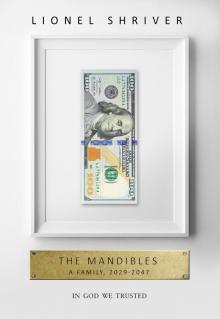 The Mandibles
The Mandibles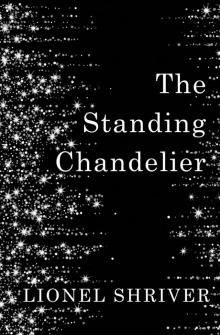 The Standing Chandelier
The Standing Chandelier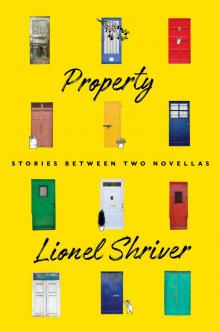 Property
Property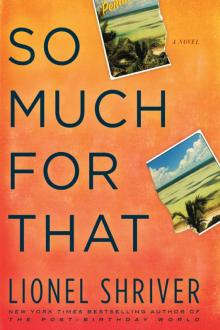 So Much for That: A Novel
So Much for That: A Novel